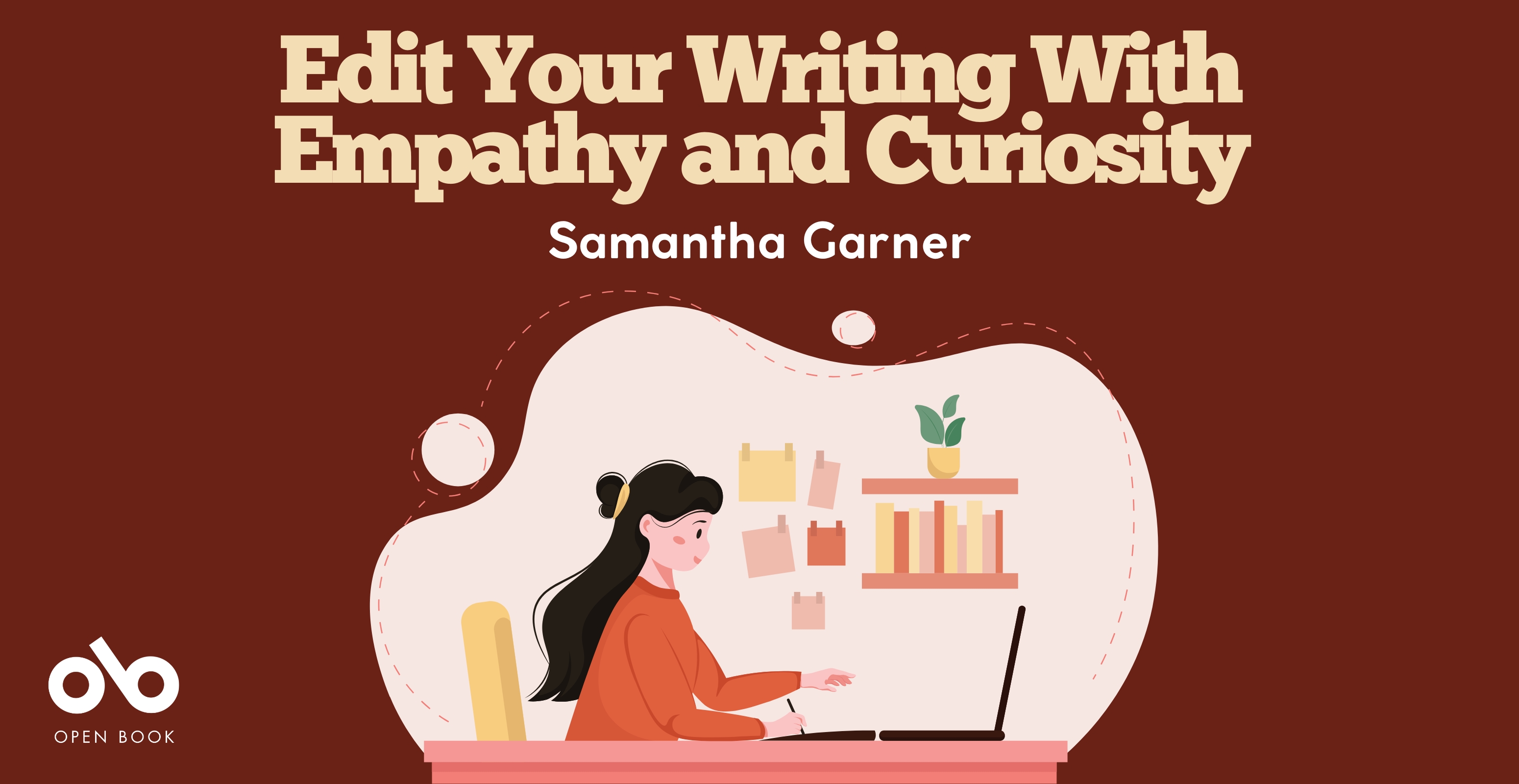Edit Your Writing with Empathy and Curiosity
By Samantha Garner
Are you a writer? How do you feel about editing? If you’re like many writers you’ve probably just groaned or hissed at your screen. I get it—editing can feel like the most arduous thing about being a writer sometimes.
We invent worlds in our heads and share them with the world, creating engaging stories and inventing compelling characters. It’s magical. But by contrast, editing puts the brakes on all of that. You chip away at your creation, deleting and culling and reordering. You might even have to untangle days’ worth of work or even discard it altogether.
Despite the bleak editing picture I just painted, I have a confession to make: I actually love editing. Not all the time, mind (I’m not a monster), but most of the time.
There’s no more vulnerable time for your writing project than in the early stages. It can feel especially fragile. At that stage editing can also feel the harshest. Like having a bright light flicked on when you’re happily dreaming. If this sounds familiar to you, I suggest approaching editing with a sense of curiosity and empathy, rather than thinking of it as fixing something that’s broken.
Let me give you an example. In an early draft of a novel I came to the dreadful realization that the “mystery of the missing brother” element I’d hinged the whole plot on just wouldn’t work. At that point the story was set in a generation ship in space. Sure, it’s possible that someone could hide or go missing in a closed environment like that, but with my particular story and characters, I couldn’t make it work. I felt discouraged. What a glaring error this was! I nearly threw my whole draft out the window.
But then I started asking why I had this element in the book in the first place.
Easy—the brother had uncovered some information about The Powers That Be that made him a target. So how could I bring out that element without it taking place in that exact way?
Suddenly I wasn’t the most foolish writer who’d ever lived. My novel was no longer toast. By working with my project, asking questions, I untangled the knot easier than if I had just bashed away at it with the hammer of editing. Different options presented themselves to me that worked for the story, for the characters, and for logic. No negative self-talk or blame required.
Don’t get me wrong—sometimes ruthlessness is required in editing. I say this as someone who recently removed a major character from a novel draft where she’d been living happily for nine years. I’d grown fond of her, but she was redundant. The story works much better now. There will be times when you have to hack and slash, but next time the editing process makes you doubt your abilities as a writer, try asking yourself specific questions in the spirit of curiosity instead.
Here are some more examples:
Your CanLit News
Subscribe to Open Book’s newsletter to get local book events, literary content, writing tips, and more in your inbox
- Instead of: “The secondary characters are cardboard.” Try: “How can I highlight their uniqueness and encourage them to play off each other?”
- Instead of: “This scene is boring.” Try: “What if I started this scene earlier or later? How would that change the flow?”
- Instead of: “Ugh, the second act feels twenty years long!” Try: “What obstacles could I work into the story here that would add tension?”
- Instead of: “This plot revelation is so generic.” Try: “What is the purpose of this revelation in the story/to the characters? Why don’t I brainstorm some other ways it could come about?”
- Instead of: “The dialogue is forced and I’m awful at writing it.” Try: “How would it look if my friends/colleagues/enemies and I were having this same conversation? How can I bring that energy to these characters?”
Each example addresses the same issue, whether it’s dialogue, pacing, or plot elements. But which one do you think is more appealing when you’re overwhelmed and feel like your draft is a pile of spaghetti? Editing with curiosity and empathy helps you access your deep well of creativity, and it also gives you the credit you deserve. When you’re not beating yourself up over writing “mistakes,” you’re more likely to play around, get creative, and be the brilliant writer that you’ve always been.
The views expressed by Open Book columnists are those held by the authors and do not necessarily reflect the views of Open Book.
Samantha Garner is the author of The Quiet is Loud, shortlisted for the 2022 Kobo Emerging Writer Prize. A Canadian of mixed Filipino-Finnish background, her character-driven fantasy novels explore themes of identity and belonging. When not writing, Samantha can be found daydreaming in a video game or boring a loved one with the latest historical fact she’s learned.
She can be found online at samanthagarner.ca and on Instagram and Twitter at @samanthakgarner.




